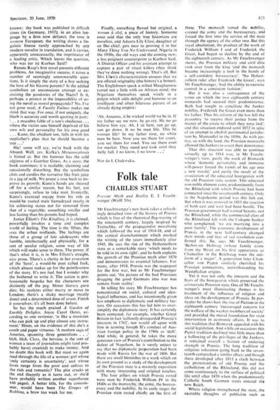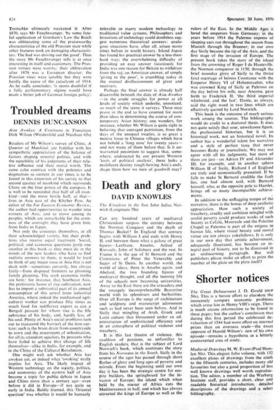Folk tale
CHARLES STUART
Prussia: Myth and Reality E. J. Feucht- wenger (Wolff 50s) Mr Feuchtwenger's new book takes a refresh- ingly detached view of the history of Prussia which is free of the rhetorical flag-waving of the nineteenth century, largely inspired by Treitschke, of the propagandist moralising which followed the war of 1914-18, and of the cynical disenchantment which marked the writing of the years immediately after 1945. He sees the rise of the Hohenzollern state as a remarkable story `which needs to be told in its own right', and he both explains the growth of the Prussian myth after 1870 and demonstrates its essential falseness. For many, after 1918, Prussia was the scapegoat for the first war, but as Mr Feuchtwenger points out, 'the picture of the bad Prussians dragging the good Germans into war was remote from reality'.
In telling his story Mr Feuchtwenger has concentrated on social, cultural and ideo- logical influences, and has intentionally given less emphasis to diplomatic and military fac- tors. On occasions this has led him to over- simplify the diplomatic story. It has certainly been contested, for example, whether Great Britain in fact 'callously disregarded Prussia's interests in 1762', nor would all agree with him in terming Joseph II's conduct of Aus- trian foreign policy in the 1780s as 'deft'. And while, in general, he takes the more generous view of Prussia's contribution to the defeat of Napoleon, he is surely unjust to say that no diplomatic preparation had been made with Russia for the war of 1806. But these are small blemishes in a work which on its own ground as a study of the development of the Prussian state is a masterly exposition with many interesting and original touches.
The four pillars on which Prussia rested were seen by Frederick William IV in the 1840s as the monarchy, the army, the bureau- cracy and the nobility. In its early stages the Prussian state rested chiefly on the first of these. The monarch tamed the nobility, created the army and the bureaucracy, and forced the first into the service of the state through the agency of the other two. But this royal absolutism, the product of the work of Frederick William I and of Frederick the Great, had begun to decline by the end of the eighteenth century. As Mr Feuchtwenger shows, the Prussian military and civil dlite took over from the king 'and the monarch became increasingly a tool in the hands of a self-confident bureaucracy'. 'No Hohen- zollern ruler after Frederick the Great', says Mr Feuchtwenger, 'had the ability to exercise control in a consistent fashion.'
But it was also a consequence of the terms on which the two eighteenth century monarchs had secured their predominance. Both had sought to conciliate the Junker nobility, Frederick the Great even more than his father. Thus his reform of the law left the peasantry 'to receive their justice from the master of the estate to which they were tied', and this situation endured until 1872 in spite of an attempt to abolish patrimonial jurisdic- tion by Manteuffel in the 1850s. As with jus- tice, so with the land, the Prussian monarchs allowed the Junkers to assert their dominance.
That this situation was able to continue virtually up to 1914 was, in Mr Feucht- wenger's view, partly the work of Bismarck whose 'demonic personality and immense will-power forced the trends of his age into a new mould,' and partly the result of the association of the educated bourgeoisie with the old Prussian state system. This educated non-noble element came predominantly from the Rhineland with which Prussia had been connected since the seventeenth century. Only in the Napoleonic period was this link cut. But when it was restored in 1815 the reaction of both east and west had been hostile. The Prussian government had wanted Saxony, not the Rhineland, while the commercial class of the Rhineland felt with the Cologne banker who complained, 'we are marrying into a poor family'. The economic development of Prussia in the next half-century changed their minds and fear of red revolution con- firmed this. So, says Mr Feuchtwenger, 'Bethruinn Hollweg (whose family came from the West) on his first appearance as Chancellor in the Reichstag wore the uni- form of a major'. A generation later Chan- cellor von Papen similarly cherished his Prussian connections, notwithstanding his Westphalian origins.
Yet it was not only the interests and the fears of the bourgeoisie which preserved the aristocratic Prussian state. One of Mr Feucht- wenger's most illuminating themes is his treatment of the influence of religion and ideas on the development of Prussia. In par- ticular he shows how the rise of Pietism in the eighteenth century 'encouraged concern for the welfare of the weaker members of society' and provided the moral foundation for state intervention in economic affairs. It was to this tradition that Bismarck appealed with his social legislation. And while on occasions this Pietist tradition declined into little more than a hallowing of the privileges of the Junkers, it remained overall a feature of enduring strength in Prussia. The long tradition of religious toleration going back to the seven- _ teenth century had a similar effect; and though there developed after 1815 a clash between the protestantism of old Prussia and the catholicism of the Rhineland, this did not come continuously to the surface of political life until after 1870 when the predominantly Catholic South German states entered the new Reich.
Where religion strengthened the state, the excitable thoughts of publicists such as
Treitschke ultimately weakened it. After 1870, says Mr Feuchtwenger, 'by some fate- ful application of Gresham's Law the Reich was obliterating some of the praiseworthy characteristics of the old Prussian state while other features took on damaging characteris- tics. The bad was driving out the good'. Thus the story Mr Feuchtwenger tells is at once interesting in itself and cautionary. The Prus- sian virtues were worthy: their obliteration after 1870 was a European disaster; the Prussian vices were ignoble but they were hardly the cause of the cataclysm of 1914. As he sadly concludes, 'it seems doubtful if a fully parliamentary regime would have made a better job of German foreign policy'.



































 Previous page
Previous page